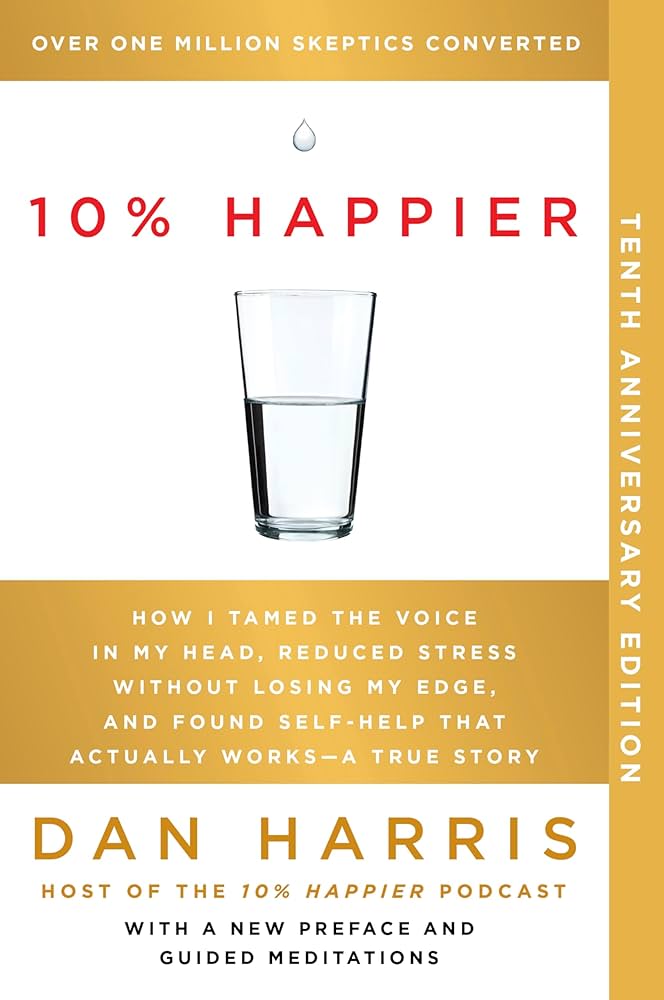
2024-10-01
LIFE MGMT
|
10% Happier
by Dan Harris
Publisher Note:
After having a nationally televised panic attack on Good Morning America, Dan Harris knew he had to make some changes. A lifelong nonbeliever, he found himself on a bizarre adventure involving a disgraced pastor, a mysterious self-help guru, and a gaggle of brain scientists. Eventually, Harris realized that the source of his problems was the very thing he always thought was his greatest asset: the incessant, insatiable voice in his head.
We all have an inner narrator. It’s what has us losing our temper unnecessarily, checking our email compulsively, eating when we’re not hungry, and fixating on the past and the future at the expense of the present. Most of us assume we’re stuck with this voice—that there’s nothing we can do to rein it in—but Harris stumbled upon an effective way to do just that.
10% Happier is now considered a classic text on the power of meditation, an introduction to the practice that can convert even the most hardened skeptic. With over a million copies sold, 10% Happier is the go-to guide, and with meditation now a widely accepted and encouraged practice, Dan Harris is a pivotal and approachable figure in the field who has built a thriving platform based on the ideas he first presented in this book.
Troy Note:
I read this book slightly by accident, or at least my motivations shifted as I read the book. I originally grabbed it because I thought that Dan Harris inadvertantly kinda saved my life in 2011 through an interview I read about him and his anxiety. I at the time was in an intense battle with anxiety in the years after my mother died and was in pretty deep water with every new day pushing me further to sea.
During this, I stumbled upon this interview and in reading it, something in me clicked. I wouldn't say I was immediately fixed, but it was the first wave that pushed me closer to land. So given that reasonably significant moment in my adult life, when I saw a book written by the guy I think threw me that line, the purchase was done.
What I didn't expect was for him to bring me back to a practice I dabbled in for a bit dozen years prior. I'm now a near daily meditator and without any sort of doubt, the better for it.
Passage(s) of Note:
Straight from childhood, I was a frequent mental inventory taker, scanning my consciousness for objects of concern, kind of like pressing a bruise to see if it still hurts. In my view, the balance between stress and contentment was life’s biggest riddle. On the one hand, I was utterly convinced that the continuation of any success I had achieved was contingent upon persistent hypervigilance. I figured this kind of behavior must be adaptive from an evolutionary standpoint—cavemen who worried about possible threats, real or imagined, probably survived longer. On the other hand, I was keenly aware that while this kind of insecurity might prolong life, it also made it less enjoyable.
there was science to suggest that pausing could be a key ingredient in creativity and innovation. Studies showed that the best way to engineer an epiphany was to work hard, focus, research, and think about a problem—and then let go. Do something else. That didn’t necessarily mean meditate, but do something that relaxes and distracts you; let your unconscious mind go to work, making, making connections from disparate parts of the brain. This, too, was massively counterintuitive for me.
I began to examine the source of my drive. Was it rooted in my privileged upbringing? Maybe this is just what "people like me" did? Was it because I grew up in a town crawling with rich kids whose parents drove Porsches and BMWs, while my folks—academic physicians, not bankers—drove a shit-brown Plymouth Valiant and a gray Chevy Chevette? Much of my adolescence was characterized by a self-imposed feeling of lack. Now that I was a "spiritual" guy, maybe it was time to transcend my bourgeois conditioning?
Here I was, two and a half years after I’d first discovered Eckhart Tolle, still wrestling with the same question: Was it possible to strike a balance between "the price of security" and the "wisdom of insecurity"?
Joseph often told a story about his first meditation teacher, an Indian guy named Munindra, who used to advise all of his students to keep things "simple and easy." One day, Joseph came upon Munindra in the village marketplace, haggling fiercely over a bag of peanuts. When confronted about this apparent contradiction with his simple-and-easy mantra, his teacher explained, "I said be simple, not a simpleton."
|












